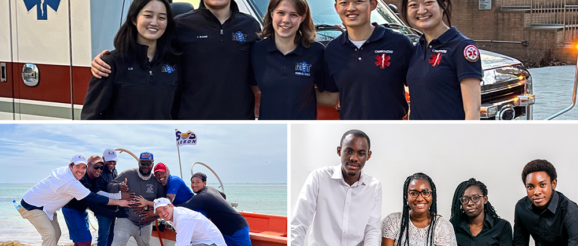MIT PKG IDEAS Social Innovation Challenge grants more than $60,000 to student-led teams to address pressing societal issues

Now in its 22nd year, the MIT Priscilla King Gray (PKG) Public Service Center’s IDEAS Social Innovation Challenge has prepared over 200 student-led teams to utilize innovation for social good. In addition to providing over $1.1 million in funding, the PKG Center has enlisted diverse partners to mentor teams in refining and implementing their ideas. Over half of past IDEAS teams remain active today, and many alumni continue to contribute to the program as judges, mentors, and reviewers. This continued involvement points to IDEAS’ success in cultivating a strong community of mission-driven innovators over the past two decades.
To celebrate this spirit of social innovation at MIT, IDEAS held a virtual awards ceremony on April 23. The ceremony brought together this year’s 18 finalist teams and the many community members who make IDEAS possible.
The keynote speaker, Kevin Kung SM ’13, PhD ’17, highlighted how IDEAS empowers students to create positive change in sustainable ways. Kung earned his PhD at MIT in 2017, focusing on biofuels and energy. Kung’s company, Takachar, transforms waste biomass into globally marketable products. Takachar got its start at MIT through PKG Fellowship funding and a $5,000 grant from the IDEAS Social Innovation Challenge in 2012. In 2021, the Royal Foundation awarded Takachar the prestigious Earthshot Prize to continue carrying out its mission of reducing smoke emissions and improving life expectancy in India.
In his address, Kung shared his experience honing multiple ventures to reduce smoke emissions, including developing prototypes and working closely with local farmers in Kenya to create change. He urged finalists to “become one with the communities you serve” while paying attention to the right time to “give up control of the project’s narrative such that it can blossom beyond what you imagined.”
Attendees also had the chance to hear from a 2022 IDEAS grantee, Birth by Us, a mobile application aimed at partnering with health-care providers and Black communities to reduce persistent maternal mortality rates in Black women in the United States. Last year, Birth by Us received a $15,000 grant from IDEAS to further their venture to support expectant people who face systemic oppression in health care. MIT senior and Birth by Us co-founder Mercy Olidapo shared that since receiving IDEAS support, Birth by Us has been able to grow a wait list of over 150 parents, partner with a nonprofit to run a pilot, expand their team, and gather feedback from mothers, doulas, and other maternal health experts. Olidapo noted that “support from the PKG Center and other MIT entities has been invaluable to this success.”
In the past five years, the PKG Center has worked to bring this emphasis on community partnerships for social change to the forefront of IDEAS. As PKG Center Assistant Dean for Social Innovation Lauren Tyger emphasized in her opening remarks, IDEAS has transitioned from a business competition to robust experiential learning program that approaches innovation through social impact and community-based lenses. As a collaborative, community-centered challenge, IDEAS is aligned both with the PKG Center’s mission to offer academically aligned programs that emphasize tech for social good and MIT’s mission of equipping students to solve the world’s greatest challenges.
The 2023 IDEAS Challenge grantees were announced at the close of the ceremony. Five teams received juried grants to implement their projects. These teams were selected by a group of experts across a variety of industries who volunteered as IDEAS judges. The winning teams include:
For the fourth year, IDEAS partnered with MIT Solve to present three additional teams with a Crowd Favorite Award. These teams each received $2,500 in funding after amassing over 2,500 votes in the 2023 IDEAS Virtual Showcase:
In line with IDEAS’s commitment to foster an educational, collaborative environment, each of the 18 finalist teams received $1,000 in seed grant funding and extensive feedback on their proposals though participating in the program. Learn more about the incredible finalists here.
The IDEAS finalist cohort also participated in an eight-week seminar series aimed at engaging teams in the frameworks of ethics-rooted, rigorous social innovation. Much of the IDEAS programming was held at iHQ, MIT’s hub for innovators and entrepreneurs — an ideal location for convening interdisciplinary innovators, alumni, faculty, and guest speakers around a shared goal of advancing social wellbeing.
According to participants, this educational foundation allows IDEAS to fill a niche in MIT’s extraordinary innovation and entrepreneurship ecosystem. Abigail Schipper, team-lead of LifeSaveHer, shared that “the seminar series was an invaluable resource for us in conceptualizing how our project was going to impact all the different people who could interact, directly or indirectly, with our product.” Medikana team-lead Corina Negron commented that “every team got to benefit” due to the educational programming embedded in the Challenge. SOS team-lead Andres Bisono Leon noted that IDEAS is “a complement” to other innovation-focused programs on-campus because it focuses on social impact.
IDEAS also intentionally cultivates a community of learning and practice. Akorfa Dagadu, the team-lead for Ishara, emphasized that the Challenge is a “great place to be for an emerging social entrepreneur” because participants are “surrounded by like-minded people and a community who understand just how rigorous navigating the social impact space can be.” Schipper also emphasized that building community with IDEAS alumni and current team members makes her “feel lucky to be at MIT and to be surrounded by people who are willing to both think deeply about solving problems for social good, and also have the guts to put themselves out there and try to implement their ideas.”
Over the 16-month implementation period, the PKG Center will continue cultivating this sense of community as all grant recipients receive tailored support from industry experts. As PKG Center Associate Dean and Director Jill Bassett shared during the ceremony, the PKG Center is looking forward to another 22+ years of cultivating student social innovators and entrepreneurs through IDEAS.
